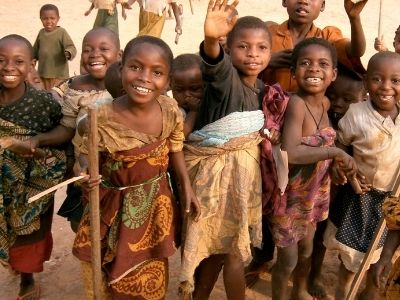
Recently I was able to speak with Fr. Mbinkar of the Diocese of Kumbo, which is located in the west African nation of Cameroon to discuss how the Mission Cooperative Plan (MCP) makes a difference in his country. Cameroon has three major religious groups, the largest being Catholics, then Protestants, followed by Muslims and finally African Traditional Religions and non-believers. Established in 1982 the Diocese consists of 37 parishes with a population of 202,000, which represents 25% of the total population. Fr. Mbinkar is in Northern Virginia furthering his studies in Canon Law at Catholic University. He is currently in residence at St. Mark Parish in Vienna.
The Diocese of Kumbo is one of the Mission dioceses supported by the Mission office. Within the Diocese of Kumbo, the parishes support many missions. Father’s home parish has about 30 missions. They are small, remote villages that take hours to get to. Some are 6 hours walk through rivers, grass land and brush. In certain areas there are no roads so one has no choice but to walk. The priests visit these areas in rotation so that each mission has a priest come about once every three months.
Many of these small villages were created because of conflicts, some current, some from decades ago. The people are subsistence farmers who live from day-to-day. These villages are so remote that you can stand on a mountain and see nothing for miles around. Eventually someone crosses paths with others and they start to connect with the outside world. That connection is where the missionaries are able to begin to bring assistance to the villagers.
Father stated, “The key to evangelization is education.” Father went on to explain how the people need knowledge in order to understand their faith. The missions bring schools and teachers to the villages. The people begin to see that someone cares about them and it gives them hope. They learn the skills to grow surplus crops to sell or to store during times of drought and subsequent famine.
Many of the missionaries in Cameroon today were born there but they follow in the footsteps of those who went before them. The missionaries from the 1800s came with no knowledge of the landscape or the language. The original missionaries were from the Society of the Catholic Apostolate also known as the Pallottines. Other groups followed and in the 1923 the Mill Hill Fathers came to evangelize the area that would become the Diocese of Kumbo. They continue their work in Kumbo to this day. Father is greatly inspired by these groups of missionaries. “They planted the seed of faith that continues to grow today.”
The mission brings material goods, but it also brings hope. The people know it is not just a day-to-day existence but that they have opportunities and potential. The MCP makes this great difference in their lives.